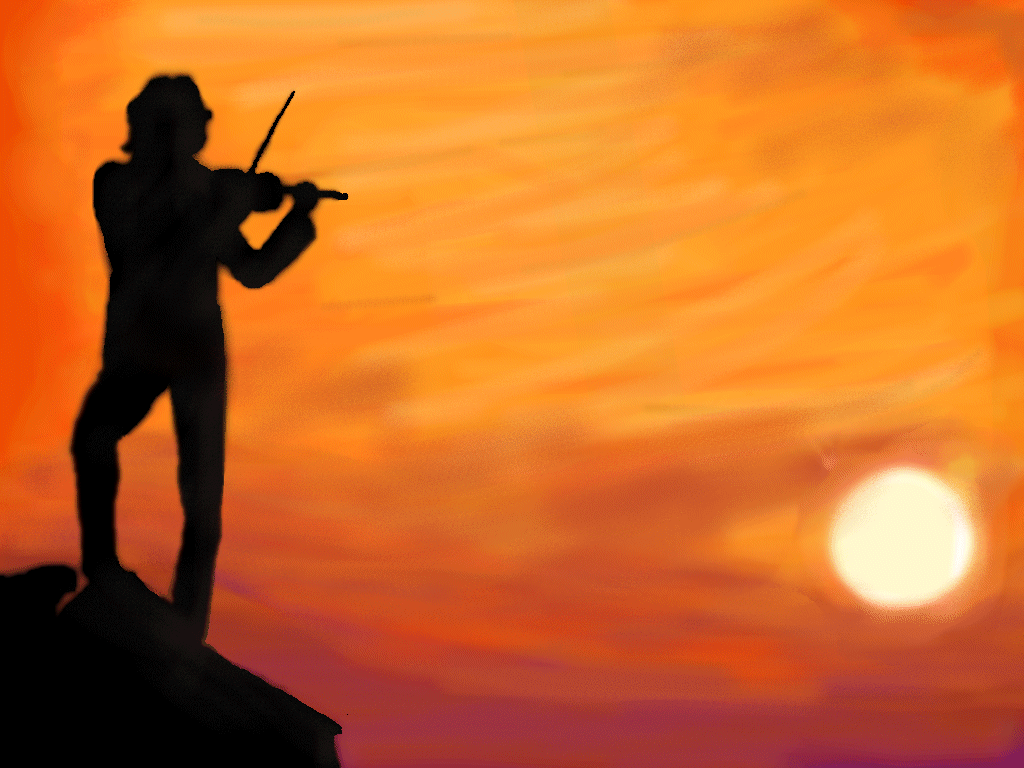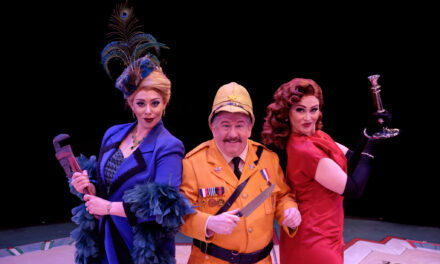Fiddler On The Roof
Book by Joseph Stein
Music by Jerry Bock, lyrics by Sheldon Harnick
Directed by John Leffert
Review by Keith Waits
Entire contents copyright © 2015 by Keith Waits. All rights reserved
That CenterStage at the Jewish Community Center chooses to close its centennial season with Fiddler on the Roof is no mystery. One of the most famous of Broadway musicals is rightfully seen as an important milestone in the development of the Jewish identity in America. Exactly how much so is explored with great insight in Alisa Solomon’s Wonder of Wonders: A Cultural History of Fiddler on the Roof, which traces the full history: from Sholem Aleichem’s original stories in Yiddish, through their growing popularity in the aftermath of the Holocaust and first stage adaptations in the 1950’s, up to the musical itself, in versions for film and such unlikely locations as an all-Black student production in the Bronx supported by the show’s creators.
Perhaps more importantly she digs into the enduring, widespread appeal of Fiddler, and how a story about Jewish life over 100 years ago, told with great cultural specificity, has such resonance in the hearts and minds of non-Jews. Watching this production reminded me of how the show speaks to our need for community, a need to belong to a social fabric that transcends the details of life in a shtetl.
Most of the characters fill a need in the village: Tevye is the milkman, Lazerwolf is the butcher, Motel is the tailor, etc. No one is idle; everyone is essential. If anyone leaves, they would have to be replaced by another with those skills. For an audience accustomed to choosing service and goods from a wide variety of options, such an ideal must resonate powerfully.
Overall, the production is effective, but some of the bigger moments just miss being all that they could be. The final moments of the first act are the best example: the disruption of the wedding of Tevye’s eldest daughter, Tzeitel, is meant to feel tragic and foreboding, yet it plays as tepid and underwhelming. An uncharacteristic thinness in the musical arrangements only exacerbates the matter.
Yet there is considerable emotional impact. This is due in part to the inevitable and cumulative weight of the story, but also from the thoughtful and well-judged level of individual performance. Some of the more intimate moments are beautifully executed: second-born daughter Hodel’s farewell to her father while waiting for the train that will separate them forever in “Far From The Home I Love” (a marvelous reading from Charlotte Campbell), or the plaintive duet between Tevye and his wife, Golde, “Do You Love Me?” And we might not ask much more of those two characters than is delivered in the performances of Monty Fields and Carol Dines. They both sing well and play the humor and pathos with skill and timing, finding the classic tone of the piece. Most of the other principals fall into line in nearly equal measure. Margo Woolridge, Ms. Campbell, and Ashley Gurnwell are a comely trio of as the three of five daughters whose romances drive the plot. R. Wayne Hogue was a delightful Motel, the youth becoming a man in the claiming of Tzeitel as his bride. George Robert Bailey makes for a fine Lazerwolf (always my favorite name here) and has a full and authentic beard that makes the small number of fake ones look all the more silly. Jordan R. Price is Perchik, the socialist activist who steals the heart of 2nd daughter Hodel, and his duet with Ms. Campbell, “Now I Have Everything,” is another highlight.
Barbara Myerson Katz is a memorable Yente, the matchmaker, and the fact that talent such as Jason Cooper and John Youngblood are counted among the remaining supporting players reaffirms the depth in this ensemble.
The staging is very traditional, except for some arguably appropriate fluorescent glow-in-the-dark effects in the surrealistic nightmarish visitation of spirits in “The Dream.” The dancing is subdued, and only takes flight in a couple of instances, but there is a very creditable version of the famous and challenging “bottle dance” that found the audience holding its breath, and the tavern confrontation with Gentile Russian men in “La Chaim” reaches a reasonable level of excitement.
Fiddler on the Roof remains one of the great musicals because it develops a strong story with indelible, three-dimensional characters. It may stray from its source material, and arguments on this point vary, with many historians maintaining that Sholem Aleichem’s vision of Jewish life and culture in a Russian shtetl is already romanticized enough that we can only imagine how far from reality a Broadway musical adaptation might be. But one might also argue that it is this cumulative distance from documentary realism that enables the story to strike such a deep chord in such a wide-ranging audience for such a long time.
Fiddler On The Roof
March 12, 14, 19, 21, 23, 26, 28, 2015 @ 7:30pm
March 15, 22, 29, 2015 @ 2:00pm
CenterStage
Jewish Community Center
3600 Dutchman’s Lane
Louisville, Kentucky 40205
502- 459-0660
Centerstagejcc.org
 [box_light]Keith Waits is a native of Louisville who works at the Louisville Visual Art Association during the days, including being one of the hosts of PUBLIC on ARTxFM, but spends most of his evenings indulging his taste for theatre, music and visual arts. His work has appeared in Pure Uncut Candy, TheatreLouisville, and Louisville Mojo. He is now Managing Editor for Arts-Louisville.com.[/box_light]
[box_light]Keith Waits is a native of Louisville who works at the Louisville Visual Art Association during the days, including being one of the hosts of PUBLIC on ARTxFM, but spends most of his evenings indulging his taste for theatre, music and visual arts. His work has appeared in Pure Uncut Candy, TheatreLouisville, and Louisville Mojo. He is now Managing Editor for Arts-Louisville.com.[/box_light]



